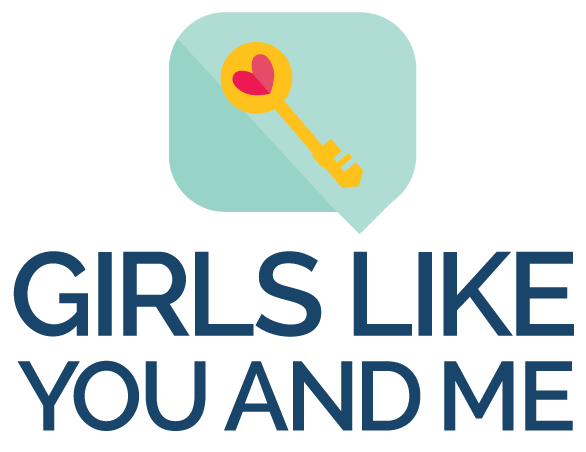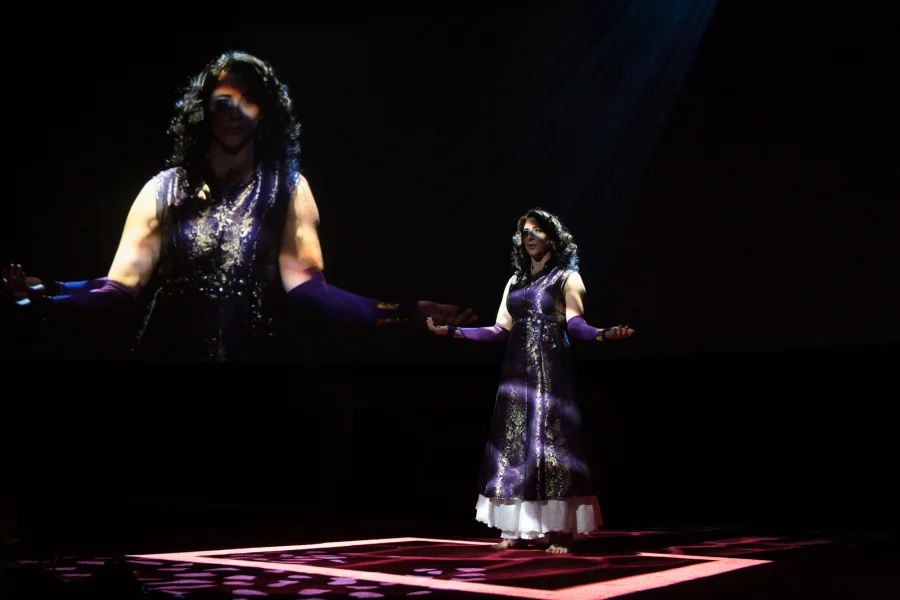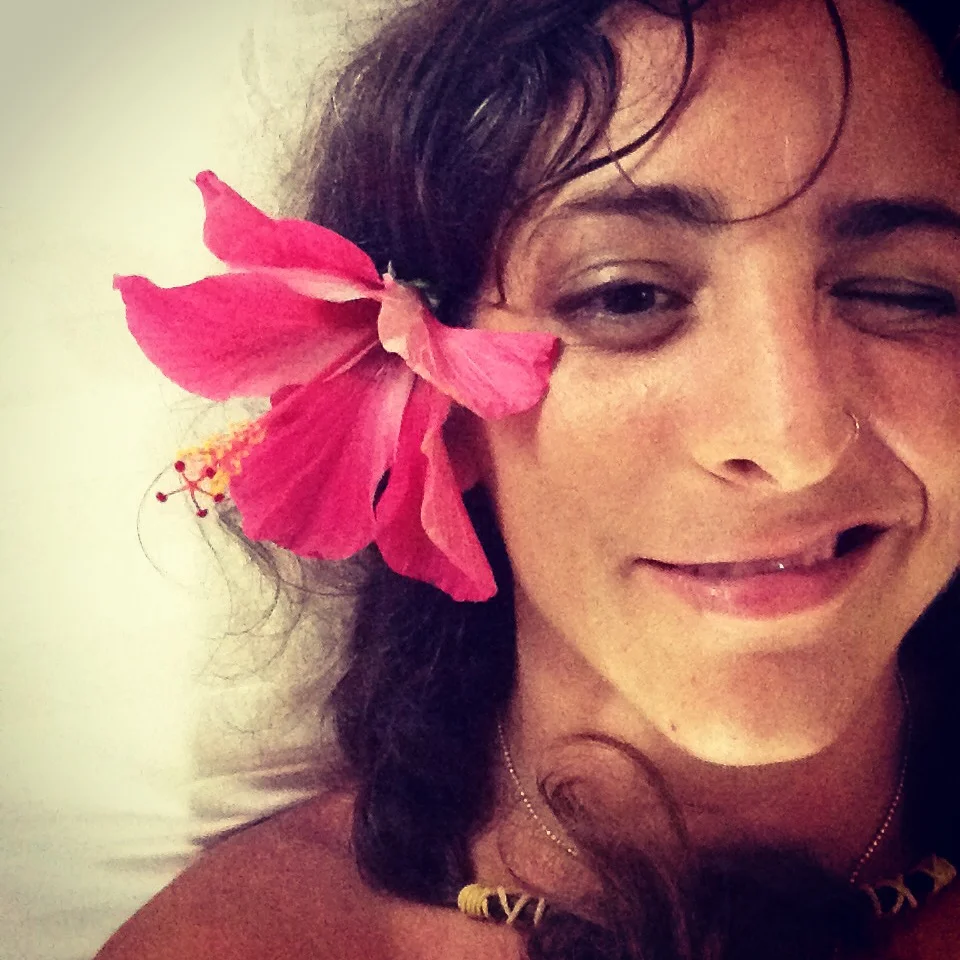Science Fiction Writer Monica Byrne writes what she wants to read
Monica Byrne wanted to be the first person to set foot on another planet as an astronaut and astrobiologist. Then, she realized that she'd rather stay here on Earth, imagining a different world as a science fiction writer. She tells us how she changed tracks, why she believes that science fiction is an activist platform, and how her low tolerance for unhappiness makes her more inventive in making a living as a writer.
Monica strikes a power pose at about 15. She swam competitively from ages 4 to 18.
Fast facts about Monica
Where she’s from: Annville, Pennsylvania
Grew up with: her mom, dad, and four older siblings
Education: Bachelor's degree in Biochemistry from Wellesley College and a Master's degree in geochemistry from MIT
Where she lives now: Durham, North Carolina
Growing up she thought she'd be: about 10 things simultaneously, then an astronaut
Now she’s: a science fiction writer
What were you like growing up?
I grew up in the most idyllic, small-town America town that you can imagine. It was this safe place to ride your bikes around in the sunset. It was a very happy childhood.
I was only interested in art up until about age 12 or 13, and then I hit adolescence. “How do I get into the popular clique?” became my preoccupation of the next couple of years. I found out that I could not pretend to be someone I was not. I was much too nerdy and much too sheltered for the kids I was hanging out with more, and I just didn't fit in.
After a lot of serious, upsetting bullying, right before I started 9th grade, I decided that I was going to be an astronaut. I bent all of my willpower towards that goal for the next 10 years, and that included not caring about whether I was popular, studying really hard, going back to reading, and taking school and my grades really seriously, and I was much happier after that, so much happier.
What was your life like outside of school?
I read all the time. I got hooked on a lot of science fiction and fantasy series, especially, and developed very elaborate rituals around reading where I would only listen to certain kinds of music and only burn certain scented candles while I was reading. When I was 14 and decided to be an astronaut, I started keeping a diary, and that more than any other single thing in my whole life has just set me on the path I am now, just the daily chronicling and reflecting on one's life.
I was losing my mother at the same time. She had cancer and the radiation treatments were slowly robbing her of mental faculties. In high school, I barely talked about it, and I never talked about it with friends. I didn't trust that anyone would understand. I could talk to my siblings about it, but they also didn't get what it was like living there day to day. All of them were considerably older, so when mom started getting really sick, I was the only kid in the house.
How did you choose to study biochemistry is college?
A big part of it was the drive to be an astronaut. Science and math, I had to work really hard at, and I liked working really hard. When I understood protein synthesis or the concept of limits in calculus, it was the greatest high. Biochemistry would be the best training for being an astrobiologist, and also I loved the lab. It was just magical to me that the world could be so submissive to reason.
Did you feel like you had a creative outlet in science? How did you feed that part of yourself?
I wanted science to be a creative outlet, and it wasn't. Creative thinking is encouraged, but it's still about getting problem sets right. I struggled so much with organic synthesis in organic chemistry, because I could think of 10 different ways to make a certain compound instead of the most efficient way. Even so, that training gave me so much grounding for what I did later.
I was in an a cappella group, and I still made sure that I wrote every week. Every Friday, I would go to the greenhouse at the end of the science center and sit by the fountain and write there, and that ritual just centered me.
Can I allow myself to just do what gives me most pleasure in the world, which is writing?
You went straight from undergrad to graduate school in geochemistry. What was that like?
At MIT I was trying to make science creative in the way that I needed to be creative, and it couldn't be. It came to me writing for the MIT Tech a column called “I Did It for Science,” and I started taking an improv class. My third semester in graduate school, I finally hit a wall. This is not worth it. Can I allow myself to just do what gives me most pleasure in the world, which is writing? Can I just do that instead of forcing myself into this shoe that doesn't fit anymore? I decided that I would finish the thesis so that I would have a Master's, so that I could get lucrative jobs afterwards that would support me while I wrote. It took 8 months, but I got a good thesis out, and then I was like “goodbye, science.”
When did you start focusing on writing fiction?
For a while I did do journalism, and then I had a very profound moment. I was saying to this improv teacher, “all I really want to do is write science fiction, but I feel like I really need to pay my dues first by being a journalist,” and he said, “If you want to write science fiction, just start writing science fiction.” I quit a very good journalism job, and took a job as a lab tech that would allow me to write at night, and that's how I started writing.
What drew you to science fiction?
Science fiction, to me, is the literature that has the most possibility for activism, for re-envisioning alternatives to how the world is by projecting different futures in different directions, like if we go along this path, this is what the world might look like. It's about shifting the frame. Science fiction reframes questions radically. In my opinion, science fiction can be the most feminist genre, because it is all about reframing the question.
The Girl in the Road started with the image of a bridge that spanned an entire ocean. That's what it began with. It was nothing about feminism, queerness, redefining the hero, anything like that. Being engaged in the news, being engaged with people that you find interesting are all incredibly important to the work, and they will just naturally come out when you sit down to write.
Basically what I'm finding is that you have to be your own entrepreneur.
You write full time; that is, you don’t have a day job. How do you make those economics work?
I never had student debt, so that's a big part of it. I also am healthy. I don't have children, I don't own a house, I'm not married, and all of those also happen to work in my favor economically.
I had day jobs for a long time to support myself while I was writing. The Girl in the Road sold for a very good advance, enough that I could live off of it for three years. An advance is basically a bet that the publishing house makes against eventual sales. Especially with a debut author, they're pretty sure the author won't make back that advance. Now, I am out of that money, and I have been trying to figure out how to keep this going. I want to have complete control over my time and my schedule. Basically what I'm finding is that you have to be your own entrepreneur. There are so many options of how to be an artist, and none of them are entirely clear cut. So, I have a Patreon.
Patreon is similar to Kickstarter and Indiegogo, in that it is a crowdfunding platform, but patrons pledge a dollar amount per month or story, etc. How does Patreon work for you?
I have an ongoing relationship with my patrons that feels like a mutual exchange of trust. It's so much more of a sustainable model for everybody involved because everyone who pledges to me gets my stories, in their inbox, and that's what they love and are paying for. I do have faith because of my talent, because of how hard I work - which is much more important - that things are going to come to pass. I have another novel that my agent is reading right now, and I hope the next advance is going to sustain me for a little bit longer. It would be much more secure for me to go back to a day job, but I hate being told what to do, even if I like the people, even if I trust the people. I have a rebellious spirit. So I have to figure out a way to survive on my own.
Monica performing as a 318-year-old hologram at the 2016 TED conference. Photo: Bret Hartman/TED from the TED Blog
What was it like being at the TED conference, performing your talk “A Sci-fi Vision of Love from a 318-year-old Hologram,” and getting introduced by Neil Gaiman?
He was my teacher at the Clarion Workshop, a science fiction and fantasy writing workshop that I took in 2008. When The Girl in the Road came out, he very generously gave a very generous blurb, and then he knew to ask me to come to the TED conference and read a science fiction story. He introduced me as the love child of William Gibson and Toni Morrison, which I loved. He's a very sweet guy, and being introduced by him, it's just surreal.
even really successful artists face rejection all the time. it doesn't mean you're a bad artist.
A few years ago you wrote about your anti-resume and shared that with everyone. Can you talk a little bit about why you decided to share it?
I get rejected all the time, way more than I get accepted, at least in terms of cold, hard submissions to things and rejection of submission. You have the impression that once you get to a certain level, that you just get everything. That's not the case, but I don't find it helpful that people who are successful don't talk about that.
It would've been really important to me as a teenager to understand that even really successful artists face rejection all the time. It frustrates me; it even angers me; it definitely impels me to work harder, but it doesn't mean you're a bad artist.
How do you develop that confidence in your work?
I think the fundamental practice of being an artist or a writer is to make as much work as possible. Especially if you're a writer, you can't go wrong if you read every day and write every day. I have 20 years' worth of notebooks, and that's all practice. That practice has led me to trust my writing and to trust my opinions. I've read enough books, and I trust my own opinions on those books. If I read a book that everyone says is amazing, and I don't think this is that great, then trust yourself.
Then write what you would want to read instead, and that is the only North Star that I can give. Write every day, read every day, and those will develop your own tastes such that you can weather getting rejected.
You traveled around the world researching The Girls in the Road, on a traveling fellowship. How did that work?
I traveled four months. I won the Stevens Fellowship. You apply and the finalists are called for an interview. I did actually travel by myself once before, to Hawaii. While I was in Hawaii, I took notes the whole time on what I thought my novel was going to be, and I took pictures. I juxtaposed the text and the pictures and made that into a booklet that I gave to all of the committee members. I also came up with a day-by-day itinerary and breakdown of costs, because I knew how nebulous the idea of “I'm going to write a novel about a woman who walks across the ocean” sounded. They gave it to me, which blew me away. I had 12 thousand dollars to plan a trip around the world. I started about a year later.
Trust that if you want to be a writer, everything you're going through will become useful to you, no matter how messy it feels.
What was that experience like?
Trust that, especially if you want to be a writer, everything you're going through will become useful to you, no matter how messy it feels. I'd say the first five weeks of that trip were hellish because I was just out of a relationship and I was horribly homesick and I wasn't getting enough sleep, and all of that really affected my mindset.
I was in Ethiopia, which is a hard place to travel as a solo woman, especially seven years ago, and especially when it was the first place I'd ever traveled alone. By the time I got to India, I started rebuilding myself into a much stronger person. All of that went into The Girl in the Road, very indirectly.
Monica loves to travel, and often travels alone. Here she is in Iran in 2014
Do you feel like you could tell these stories without going to the places where they're set?
If I can go to a place where a thing is set, I will go there, because there is no substitute for the felt body experience of being in a place and smelling the smells and seeing the things that you see there.
There's so much from The Girl in the Road that is taken directly from things I saw on that first trip, memories that I wrote down that really stuck with me. You know how I talked about how science fiction can shift frames in a way that other literary genres can't? Travel also shifts frames in a way that staying in my study, staying in Durham all day, every day, can't.
There has been no other factor in my whole life, besides keeping a diary, that has been more empowering than traveling alone.
You've traveled quite a bit alone. What has that been like?
My experience has been mostly incredibly positive. When I think about going to India or Ethiopia, what I'm left with is the wonder of the places I saw, the people I met, the food I ate. There has been no other factor in my whole life, besides writing every day, keeping a diary, that has been more empowering than traveling alone. Whenever I travel now, the moment when I get out of the cab and cross the sidewalk, and the airport doors swoosh open, and I'm alone, that is the best feeling in the world. I am about to go on an adventure, and I don't know what's going to happen, but I'm doing it. There's no other thing besides writing that gives me greater pleasure.
How did you imagine your life as an adult when you were growing up?
When I was 9 or 10, I was going to have different jobs: singer, jeweler, author, professional swimmer. Also I was married with 10 children, who all had their own jobs, like mathematician, professional swimmer, professional softball player, astrophysicist, artist. Those are all the things that I wanted to do and have done in various forms. My life, from one lens, looks the same as I imagined, and in another way it's very, very different. I never even considered that I would be as happy unmarried as I am.
Monica's junior high school pictures
What advice would you give to somebody who was a kid that was like you?
Writing every day, it's like a vitamin: it can't hurt you. The other most important thing I learned, especially at that crucial time when I was 13 or 14, was to create a safe space in myself. My room was my safe place where I could go to read and burn my candles and listen to my music, which was Enya.
Actually, here's a dirty secret: it's still Enya.
That is still this safe, ritualized space that I come to. I don’t necessarily mean a room. I mean a moment to check in with yourself, or a special thing that you do every day to mark the passage of time or reflect on the day. It can be prayer. Prayer is incredibly powerful in that way, and to cultivate and protect that relationship with yourself. That's how you know how to steer, going forward, because you have a relationship with yourself.
This interview has been edited and condensed.
Check out some of Monica's favorite books and find out more about her work!



